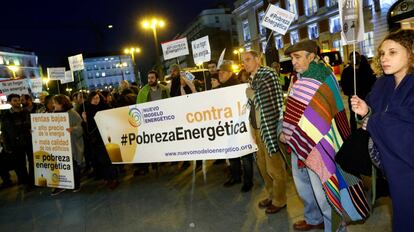OECD praises Spanish recovery but issues alert over rising poverty
Organization raises 2017 growth forecast to 2.5%, but voices concerns about poor job quality
The Spanish economy is growing at a good clip, yet poverty is on the rise due to a lack of quality jobs, according to a new report by the Organisation for Economic Cooperation and Development (OECD). “The Spanish economy is enjoying a robust recovery from a deep recession,” reads the opening line of the report, released on Tuesday.

The latest OECD Economic Survey of Spain raises the growth forecast for this year from 2.3% to 2.5%.
Yet the study also “recognizes that the economic crisis has resulted in rising levels of poverty and income inequality.”
The high share of long-term unemployed risks loss of skills, disaffection and alienation
OECD Economic Survey of Spain 2017
The OECD advocates government policies that will make growth more inclusive, including better-quality jobs, higher productivity, improved vocational education, investment in innovative businesses, expanded social relief programs, and hikes to environmental and consumption tax.
OECD Secretary-General Ángel Gurría and Spanish Economy Minister Luis de Guindos presented the report in Madrid on Tuesday.
“Despite a challenging international environment, Spain offers living proof that reforms work,” said Gurría in his opening remarks. “The economy has grown at an average rate of 2.6% over the last three years, and in the last two years it grew by 3.2%.”
Meanwhile, the public deficit dropped to 4.6% in 2016 according to OECD estimates, and will fall to 3.4% this year. Gurría quoted labor reforms, the European Central Bank’s monetary policy, low oil prices and fiscal consolidation measures for the improved outlook.

For his part, De Guindos noted that Spanish output grew over 3% in 2015 and 2016, although he admitted that the economy “is still vulnerable.”
Homework
Besides lavishing praise, the OECD report also sets homework for Spain: “Reforms. Reforms. Reforms.”
“It is critical that the reform momentum be sustained, to surmount the many remaining challenges and ensure a gradual transition to a truly knowledge-based economy,” said Gurría. “The recovery also needs to be inclusive, addressing inequalities and providing opportunities and improved well-being for all.”
The OECD identifies priority areas for making growth more inclusive, including “further reductions in unemployment, better poverty reduction policies and improving the quality of jobs through better skills, training and job matching.” The report also provides recommendations to “make the tax mix more progressive and conducive to job creation, as well as to strengthen the role of the tax transfer system to better address inequalities.”
Spain offers living proof that reforms work Ángel Gurría, OECD Secretary-General
The international organization makes a note of Spain’s notoriously high unemployment levels, especially among the young. “The unemployment rate is gradually falling thanks to stronger growth, but it remains very high, particularly among the young and long-term unemployed. About 40% of youths are unemployed, and many of them have low skills. The high share of long-term unemployed risks loss of skills, disaffection and alienation,” says the report.
Additionally, “poverty and child poverty remain high and small and poorly targeted cash transfers do little to reduce poverty.”
English version by Susana Urra.









































